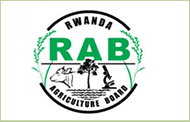Location
The Rwanda Agriculture Board (RAB) is an autonomous body established by LAW N°38/2010 OF 25/11/2010. The law specifies that: RAB has the general mission of championing the agriculture sector development into a knowledge based; technology driven and market oriented industry, using modern methods in crop, animal, fisheries, forestry and soil and water management in food, fibre and fuel wood production and processing.
RAB was formed from three agriculture agencies, namely the Rwanda Animal Resources Development Authority (RARDA), the Rwanda Agricultural Development Authority (RADA) and the Rwanda Agriculture Research Institute (French acronym: ISAR).
The Government of Rwanda expects this reform to remove the historical legacy that created artificial gaps between research and extension, strengthen the linkage with policy, and establish efficiency in service delivery through institutional integration in the agricultural sector for improved livelihoods of the Rwandan people.
This expectation premises on: physical proximity under one administrative structure, using a common standard operating procedure, which removes institutional boundaries by improving communication, mutual understanding and consensus building between extension, research and policy.
The research-extension-policy nexus is critical for intensifying the focus and increasing the relevance of research and extension to pertinent issues required for acceptable levels of agricultural sector growth and contribution of the sector to overall socioeconomic development process in Rwanda.
RAB’s Vision
Improved food security and livelihoods of all Rwandans by transforming agriculture from subsistence into modern farming through generating research and extension innovations that generate sustainable crop, animal husbandry and natural resource management
RAB’s Mission
Developing agriculture and animal husbandry through their reform, and using modern methods in crop and animal production, research, agricultural extension, education and training of farmers in new technologies
Core Values and Goals
Beliefs that are shared by stakeholders of an organization are often referred to as values. Values drive the organization’s priorities and hence provide a framework in which decisions are made. Since research and extension are the keys to success of RAB as an organization, responding to farmers’ needs through reforms and modern methods serve as core values.
‘Delivering demand-driven, market oriented research and extension activities’ thus represents RAB’s core value. Conceivably therefore, it is important that RAB’s activities are designed around this founding framework. A major strategic resource of RAB is the pool technical capacities in agriculture sector. Given this core competency, the organization requires entrepreneurship as a complement in order to translate technologies and knowledge into innovations that respond to market demands. The strategic plan presented in this document aims at setting directions for crafting and delivering the expected innovations to the end users so as to facilitate the shift of Rwanda’s farmers from subsistence to market oriented farming. This forms the goal of the strategic plan.
Members:
Resources
Displaying 1 - 2 of 2Effect of cutting time on agronomic and nutritional characteristics of nine commercial cultivars of Brachiaria grass compared with Napier grass during establishment under semi-arid conditions in Rwanda
A study was conducted to identify the most productive cultivars and their cutting management to optimize nutrient productivity in semi-arid areas of Rwanda. Four cultivars of Brachiaria brizantha (Piatá, MG4, Marandú and Xaraes), two cultivars of Brachiaria humidicola (Llanero and Humidicola), two cultivars of Brachiaria hybrid (Mulato and Mulato II) and one cultivar of Brachiaria decumbens (Basilisk) were evaluated against Napier grass (Pennisetum purpureum) in an on-farm trial in a complete randomised block design with four replicates.
Land Use consolidation A Home grown solution for food security in Rwanda
Rwanda’s economy is largely agrarian. More than 80% of the Rwanda’s projected population of 10.5 million1 depends on farming. The total land area of the country measures 24,700 square kilometers. Although about 79% of the country’s land is classified as agricultural, only 11% of the land represents permanent crop land2. The remaining agricultural lands are covered with forests, marshlands and marginal lands in the hillsides where permanent and routine cultivation of crops are not tenable.



